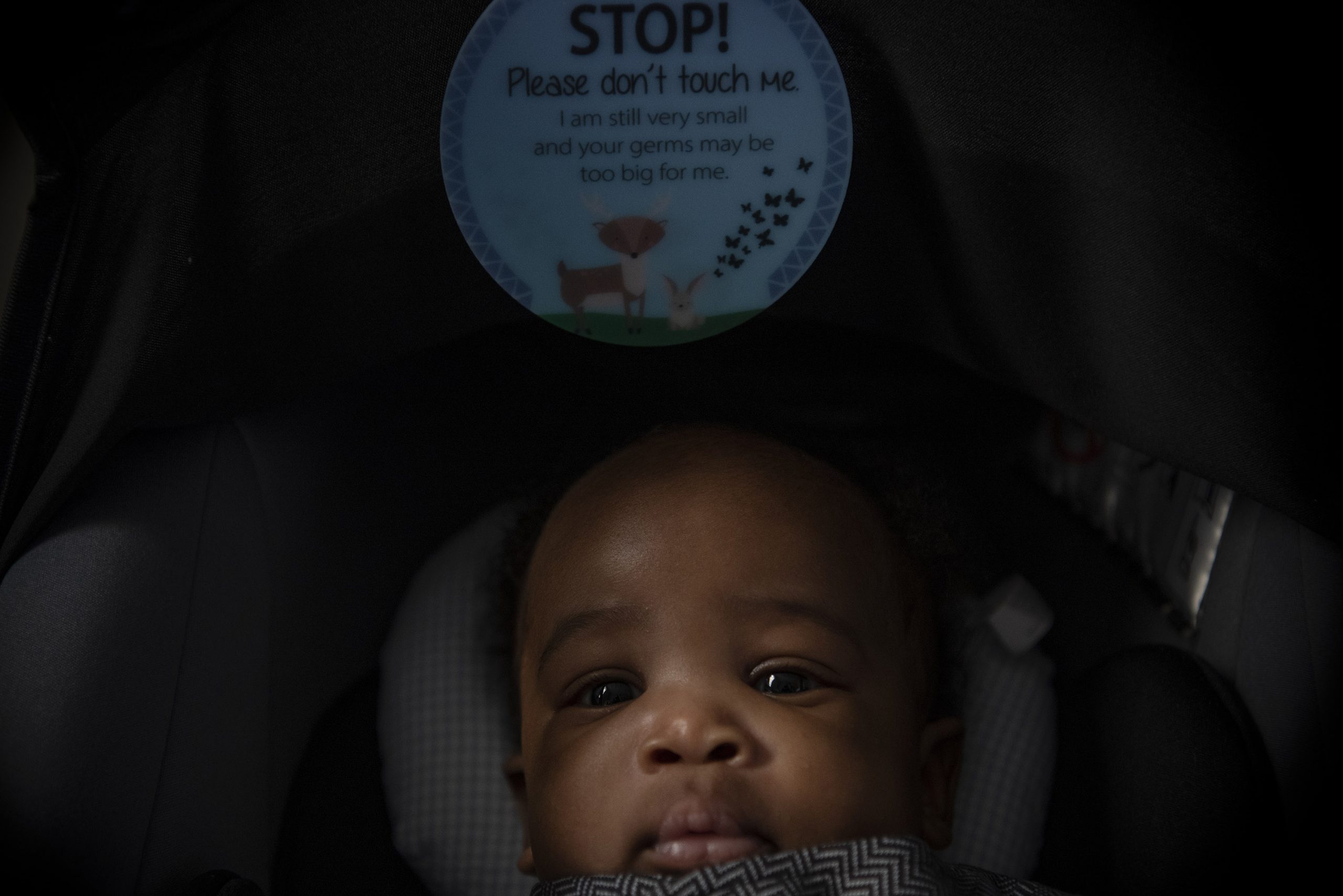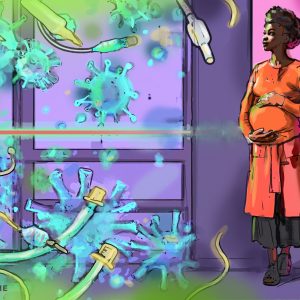Pregnancy and labour during Covid-19
New Frame traces the coronavirus through the cycle of life in a series of intimate portraits from Gauteng. This is what new mothers are experiencing in the time of Covid-19.
Author:
14 August 2020

“I feel so bad for him. He only knows four people right now in his life and I…” Her face is eclipsed by the chubby cheeks of a curious baby. Before she can continue, he repeatedly attacks the screen with the palm of his hand, babbling away in baby talk. His bottom milk teeth are obscured when his drool drenches the camera before the call is summarily cut.
“Eish, this boy! Sorry sisi, I was saying he doesn’t know any other faces or people except us,” says Maria Beda*, wiping the camera clean.
Like Beda, Thembeka Sibiya, 27, is concerned that her newborn son will not enjoy the same social life as her seven-year-old son.
“I feel sad for him because I look at Esethu and how much he loves people. He loves going out to the park to ride his bicycle, or to the restaurant to play in the play area,” she says over the periodic vibration of her breast pump. “For [the newborn], it’s going to be the normal that he knows. But for us, it’s a complete adjustment.”
Related article:
Sibiya had planned a pregnancy reveal and a baby shower “because Khaya was a rainbow baby. We had a miscarriage last year.” No amount of planning could have prepared her for the coronavirus pandemic.
There was no pregnancy reveal, no baby shower, no prenatal classes or yoga, and no maternity photo shoot as level five of the government’s Covid-19 lockdown was enforced nationwide. With retail shops closed, her anxiety orbited around what her infant would wear once he was born.
“My major anxiety was not knowing when the baby will come, because a baby can come at any time. So if you have not bought anything, you don’t know what your child will be wearing,” says Sibiya.
When the lockdown regulations eased, she was able to buy baby items but was still paranoid about contracting the coronavirus, so life outside of her home was limited to trips to the doctor’s office.

Giving birth during a pandemic
Because she was giving birth naturally, she had to go for a Covid-19 test beforehand. If positive, she would have to self-isolate and give birth in a Covid-19 ward dedicated to those who have contracted the virus. If not, she would go to the maternity ward and have a natural birth instead of a Caesarean, also known as a C-section.
While C-sections mean you are booked in on a specific date, natural births can occur at any time, including nap time, which is what happened to an unsuspecting Sibiya one evening.
“I was due for the Covid test at 37 weeks, but uKhaya decided to come at 36 weeks,” she giggles in her voice note. “So I was panicking when I was in labour, because now I can’t go to a normal maternity ward because I don’t have results declaring me negative.”

She gave birth in the Covid ward, and although she was in a room by herself, she admits she was scared of contracting the virus while there.
“I didn’t know what a Covid ward looked like … They don’t care that you are in labour – you still need to go through the whole process of waiting, writing down your details and getting your temperature taken.
“You are told, ‘Don’t walk over this line, walk on this line and stick to this side of the corridor, because on the other side it’s Covid patients.’ My partner was not allowed in the delivery room during labour because we didn’t have our Covid results,” she says.
‘Added stress’
Prior to labour, her partner had to stop attending doctor’s visits with her, too, which was unpleasant for Sibiya as they had been attending them together.
“Being pregnant already comes with anxieties and worries, and here comes Covid with all these extra precautions that you have to take. It’s an added stress that you don’t need as a pregnant woman,” she says.
Sibiya understood the concerns of the doctors, who not only had to ensure a safe delivery but also protect their lives in light of her unknown Covid-19 status. Eventually, her partner was allowed in because she was preterm and they had a private room.

Describing the labour process, she says: “It’s so uncomfortable, unfriendly and unwelcoming because you don’t even know who is helping you. Everyone is covered up and they have masks.” She was tested for the coronavirus while knee-deep in labour pains and discharged a day later along with her baby, who never saw a nursery – a new norm in labour wards.
No help
Sibiya had received help from her mother when her first son was born, but she was stripped of that with her rainbow baby.
“So now we are indoors the whole time. Here is this small baby and it’s just so… I can’t even run to the shops to get a breather because why would you be going anywhere when there is corona?”
When Khaya was three weeks old, she couldn’t take it anymore.
“Both our families are back in KwaZulu-Natal. I couldn’t go home … We [couldn’t] cross provincial borders and that affected me more after I had given birth … I was so overwhelmed and stressed out that I got a permit from my psychiatrist. I suffer from depression and anxiety and thought, before I go into postpartum depression, let me go home,” Sibiya says.
Even so, only her mother and mother-in-law have seen the baby.

“Our aunts, our cousins, friends have never seen him because we can’t go anywhere. And it’s going to be like that for a very long time.
“You can be careful and take all the precautions, but someone else may not be doing the same so you don’t want to put your loved ones through that, especially your kids … So he will just grow up here at home, and his friend will be his older brother,” she laughs.
‘Ridiculous numbers’
Mihlali Nkosi*, 29, says her gynaecologist’s rooms were at the Netcare St Augustine’s Hospital in Durban, which was shut down earlier in the year because of a coronavirus outbreak, and she disliked exposing herself to risk in the highly infectious environment.
“You don’t want to be near the hospital environment because you don’t know where this thing is and clearly everyone is sick. Just looking at the scale of how many healthcare staff were reported to be infected with the virus … it was ridiculous numbers and they kept rising,” she says.
Nkosi had considered a home birth, but there were cost and health implications. She was told that if she tested positive for Covid-19, she would have to remain in hospital for seven days while her baby was released into the care of a family member who was virus-free. A lot of thoughts crossed her mind.
“Who is now going to take care of your baby? Who are they going to go to? And this has implications for your family, too, because they also need to get tested. What if they are positive? Am I going to pass this thing on?” she asks.
Related article:
Nkosi says the healthcare workers were just as scared, nervous and frustrated as she was.
Just days before she was due to give birth, she tested positive for the virus. She was placed in a Covid-19 ward, and had to have a C-section instead of a natural birth.
“When I gave birth, it had been around six days since I had contracted it … I didn’t cough, I didn’t sneeze, I didn’t have any body aches, I didn’t have any problems, really. I didn’t show any signs of having the virus even though I tested positive,” says Nkosi.

Alone and isolated
When Nkosi regained consciousness after delivering, she realised just how alone and isolated she was. Her son was kept away from her in an incubator in a room next to her for his protection.
She was allowed to go home with her baby after recovering because she was asymptomatic.
“The concern thereafter was more on what happens now – how do I conduct myself with a newborn having the virus? A lot of what plays on your mind is more psychological than it is what you are experiencing. For me, I was just nervous. Even though I am asymptomatic, will I pass this on to my child?” she says, with him cooing in the background.

Nkosi has to wear a mask, sanitise her hands each time she touches him or changes his nappy, and was told to shower every six hours. “I am sending these voice notes with a mask on … I shower twice a day. I don’t have the time anymore,” she says, adding that these suggestions are impractical.
Nkosi is currently staying by herself. “I needed to isolate away from my family home until I feel that I am okay. I also didn’t want to potentially put my child through [that] because my parents also tested positive and were asymptomatic,” she says.
Similarly to Sibiya, she wanted a maternity photo shoot but didn’t want to expose others to the coronavirus. “There is a bit of a stigma around this thing if you test positive … even though you are asymptomatic and you are fine,” says Nkosi.
It’s been 31 days since she tested positive and a part of her feels like she has defeated the virus. “It’s so easy to panic in uncertain times like this. It’s so easy to drive yourself into states of depression. It is important for me to remain level-headed and positive, ironically,” she chuckles.
She has still not kissed her three-week-old baby boy.
*Not their real names



